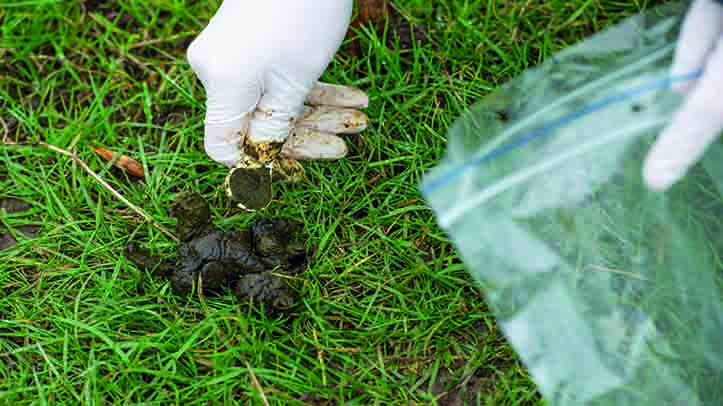While roundworm activity so far this season has been relatively low, the Sustainable Control of Parasites in Sheep (SCOPS) Group said the recent temperature increase means this could change quickly on many farms, as warm, damp conditions encourage larvae to hatch from eggs and develop into infective larvae on pastures.
Speaking on behalf of SCOPS, independent sheep consultant Lesley Stubbings said: “Lambs old enough to be grazing could now start to ingest large numbers of infective larvae, which they won’t have developed any immunity to. These larvae will develop into egg-laying adult worms inside the lamb’s gut in two to three weeks’ time.
“It is at that point a faecal egg count (FEC) can tell you about the extent of the adult worm burden in the lambs, which can then be used as a guide to the need to treat.”
Ms Stubbings said not to wait for lambs to start scouring or to show signs they are not thriving before starting your monitoring.
“Get into the habit of monitoring mobs of lambs regularly, say every three to four weeks,” she said. “This will mean you avoid unnecessary treatments but, equally as important, will not lose performance, which is inevitable if you wait for clinical signs.”
Starting early with regular FECs (every three to four weeks) also means producers can gain valuable information on the extent of the contamination going on to pastures, which will provide a heads up on how infective they will be in the coming weeks.
The exception is nematodirus eggs, as lambs develop immunity to nematodirosis (the disease cause by nematodirus) at a very early age and, therefore, identifying these eggs via FECs will indicate the likely level of risk to lambs in 2025 rather than this year.
FECs can also be used as a means of checking the effectiveness of a treatment, which Ms Stubbings recommended making use of. To do this she recommends taking samples from a mob before treatment and after treatment.
She said: “Checking the effectiveness of a treatment by taking a FEC at a set interval afterwards is a really useful process to go through, but it’s important to do a FEC beforehand too. If the FEC is not high enough to warrant a treatment in the first place, it’s a waste of time and money to treat. Plus, you can’t reliably measure the survival rate of worms afterwards because they wouldn’t have been there in sufficient quantities.
“This is very important for sheep farmers in England who intend to use the Worming Treatment Check that’s currently available as part of Defra’s Animal Health & Welfare Pathway.
“A FEC before treatment isn’t included, but monitoring and waiting until the lambs need a treatment means you will get the most from the funded test. SCOPS strongly recommends not rushing the Worming Treatment Check. For most flocks, June or July will be the best time to carry it out and maximise the opportunity available.”


